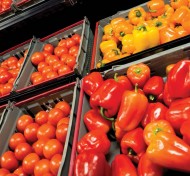 In one month last year, SRS (Svenska Retursystem AB) delivered no less than 10 million returnable retail packaging trays – trays that will go on to see hundreds of repeat uses and will end their days being ground down and re-cycled. In its sophisticated logistics operation, SRS uses the Maxinest tray from Linpac Allibert which provides quality packaging that delivers savings in the supply chain while offering substantial environmental benefits.
In one month last year, SRS (Svenska Retursystem AB) delivered no less than 10 million returnable retail packaging trays – trays that will go on to see hundreds of repeat uses and will end their days being ground down and re-cycled. In its sophisticated logistics operation, SRS uses the Maxinest tray from Linpac Allibert which provides quality packaging that delivers savings in the supply chain while offering substantial environmental benefits.
The Swedish food industry was an early adopter of logistics systems based on returnable packaging, establishing SRS in 1997. The fundamental principle behind the system was to replace single-use packaging, such as cardboard cartons, with returnable containers. The operation involves the entire supply chain, including manufacturers or producers, wholesalers and retailers in an environmentally-friendly and cost-effective system which has now become standard for the Swedish grocery industry.
The cycle of usage developed by Retursystem involves the delivery of newly washed returnable crates to the manufacturer or producer who then fills the crates and delivers them to the wholesaler. The wholesaler delivers the filled crates to retailers and takes back empty crates during the same trip and then Retursystem collects the crates for washing and quality control, after which they go back into the supply chain.
The Maxinest tray used by Retursystem was developed by Linpac Allibert to meet demands from supermarkets to cut costs, reduce packaging waste and deliver greater efficiency in the supply chain. It has been designed to offer a cost-effective way of both delivering and displaying fresh produce, meat, fish and bakery items with crates that have been designed to meet the grocery industry’s strict requirements for quality, durability and care for the environment.
The latest version of the Maxinest range, which has 20 variations, meets the growing demand for equipment that works seamlessly with automated filling, weighing and handling technology. A recess under its bale arms allows access by robotic stack/nest systems, while the reinforced base is designed for quiet, smooth operation on all conveyor types. Other features include smooth surfaces to protect contents and promote hygiene, the ability to stack 10-high on bale arms or nest up to 77 per cent of its original height with the bale arms pushed back.
For a logistics operator like Retursystem, a key feature of the Maxinest is that it can be RFID-enabled at manufacture with water and shock-resistant tags, which make them easy to track through the supply chain, helping to minimise losses and improve processing speeds.
Retursystem estimates that since introducing returnable packaging, over 700 million items of disposable packaging have been replaced, with significant gains to the Swedish grocery system. It currently has around 1,000 customers ranging from major producers to small local suppliers and the crates are used in both manual and automated handling processes.
Conny Swahn of Retursystem says: “Before our system of returnable crates existed, there was a huge variety of packaging solutions from corrugated cardboard to wooden crates – all designed for single use. When defining our system, the key reason was to reduce waste in the food supply industry and to create a more efficient and environmentally- friendly supply-chain management solution.
“The system provides more efficient, lower-cost handling throughout the supply chain with a resultant reduction in waste. The crate is an essential part of our return system and for the future, we see potential for continued growth in existing market based on the products we use now, as well as the opportunity to work with suppliers like Linpac Allibert to develop solutions for new markets.”
LINPAC Allibert
Tel: 0121 607 6700




Comments are closed.